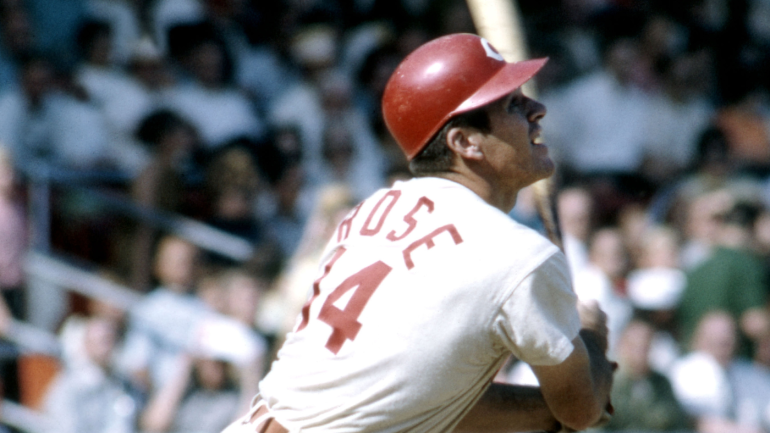
Pete Rose, the all-time hits leader in Major League Baseball, has died at the age of 83. The Rose family confirmed his passing to Sports Illustrated on Monday.
Rose spent parts of 24 seasons in the majors and over that span he amassed 4,256 hits. On Sept. 11, 1985, Rose at age 44 passed Ty Cobb with his 4,192nd hit and became MLB’s anointed Hit King. Of his nearly quarter-century in the majors, 19 of those seasons came with Rose’s hometown Cincinnati Reds, whom he also managed at one point. Rose was a three-time World Series champion – first with the Reds in 1975 and 1976 and then with the Philadelphia Phillies in 1980. Along the way, Rose was selected to 17 All-Star teams, and he won the National League MVP Award in 1973 as a member of the Reds.
While Rose’s on-field credentials as a player are unassailable and make him one of the all-time greats, the gambling scandal that led to his banishment from the game remains an indelible part of his baseball legacy. Rose has been on the permanently ineligible list since 1989, when he agreed to that punishment as a consequence of his gambling on MLB games — alleged at the time but since confirmed. In his agreement with then-commissioner Bart Giamatti, Rose was permitted to apply for reinstatement, which he did multiple times over the years to no avail.
Rose initially denied betting on baseball for years, but then in 2004 he admitted to having bet on the sport as manager of the Reds. In 2015, he finally admitted to also betting as a player. Rose’s bets were made in violation of MLB’s Rule 21(d), which reads:
Rule 21 MISCONDUCT, (d) BETTING ON BALL GAMES, Any player, umpire, or club or league official or employee, who shall bet any sum whatsoever upon any baseball game in connection with which the bettor has a duty to perform shall be declared permanently ineligible.
Rose, an obvious first-ballot Hall of Famer based on his statistical merits, was never enshrined because of that permanent ineligibility. However, it wasn’t until 1991 that the Hall of Fame ruled that players on the permanently ineligible list could not be elected or enshrined. That policy came into being roughly two years after Rose was placed on said list. It was also the year before he was scheduled to appear on the Baseball Writers Association of America Hall of Fame ballot. As a consequence, Hall voters have never had the opportunity to appraise Rose’s statistical case through the prism of his gambling violations.
Rose, a two-sport athlete at Western Hills High School in Cincinnati, signed with the Reds no long after graduating in 1960. By 1963, he was in the majors. What followed was a sprawling career that traversed eras and cultures within the game – Stan Musial was in his final season when Rose debuted, and Barry Bonds was a rookie during Rose’s final season as a player. Famed for his daredevil and reckless playing style and his head-first slides, Rose on the field emanated enthusiasm for the game – perhaps, at times, to excess. One example of such excess may have been the 1970 All-Star Game, when Rose slammed into Cleveland catcher Ray Fosse during a play at the plate and left him with a serious shoulder injury:
It was that same style that, while occasionally perilous to himself and others, that made Rose memorable even beyond his overwhelming statistical compilations. It also earned him one of baseball’s most memorable nicknames — Charlie Hustle.
Rose, though, was not style over substance, as his unthinkable hit tally suggests. Rose was a career .303 hitter with a lifetime on-base percentage of .375. He’s the all-time leader in games played, at-bats, and plate appearances. He drove in more than 1,300 runs and scored more than 2,000. Despite getting hits with such frequency, Rose also ranks 14th all-time in walks. He also stole almost 200 bases in his career. Rose came up as a second baseman, but later he’d go on to win a pair of Gold Gloves as a right fielder. In 67 postseason games and 301 plate appearances, he batted .321 with 86 hits and five home runs. In addition to the MVP award, Rose won Rookie of the Year laurels and three batting titles.
Late in his career, Rose served as player-manager after returning to Cincinnati, and his managerial tenure extended beyond his playing career. Rose’s post-playing was marred by the gambling scandal, and in 1990 he served time in federal prison for tax evasion. In 2017, he was accused of statutory rape committed in the 1970s.
It wasn’t until Rose’s book, “My Prison Without Bars,” was released in 2004 that he admitted to gambling on baseball during his playing and managing days, which came only after some 15 years of vehement denials on Rose’s part.